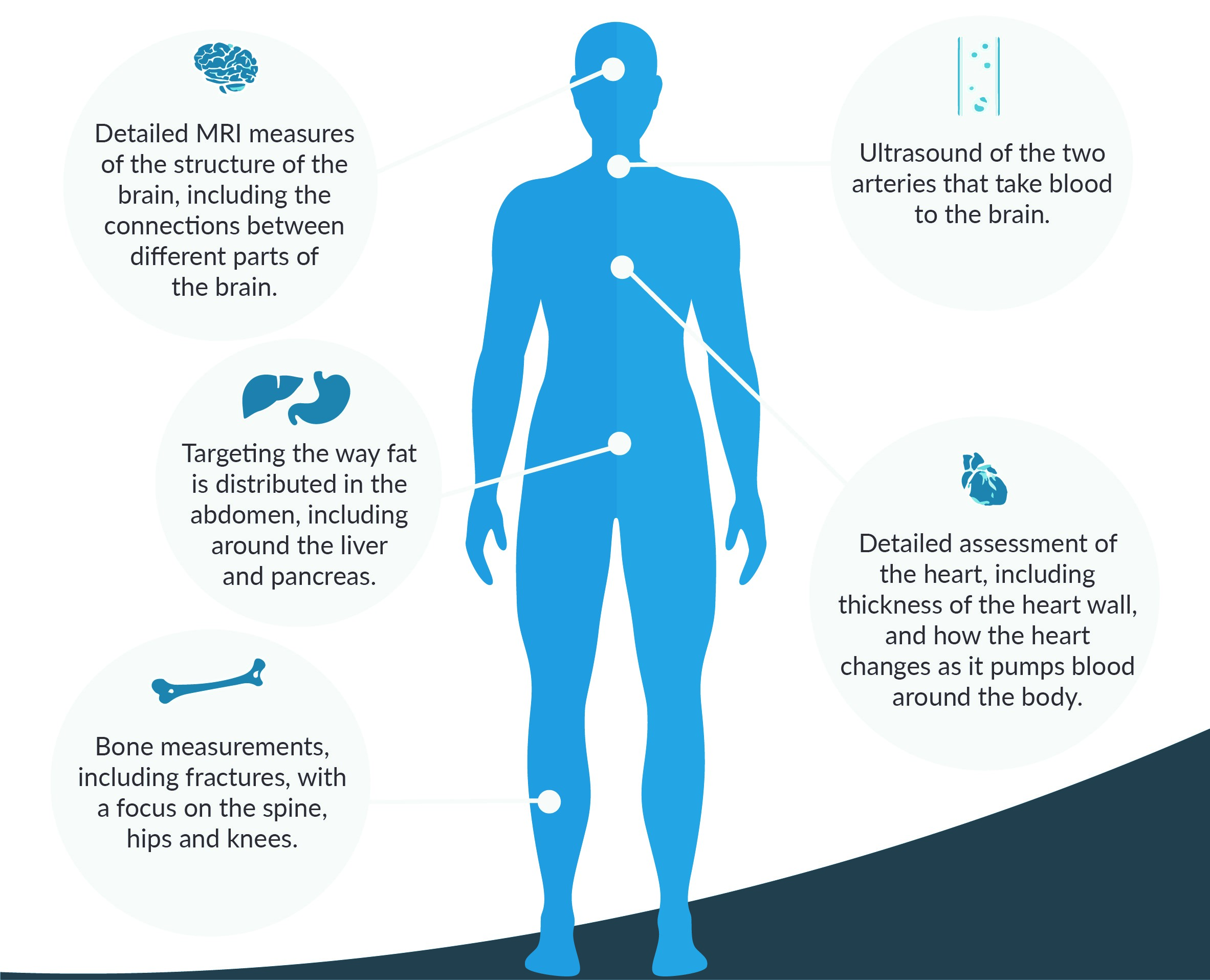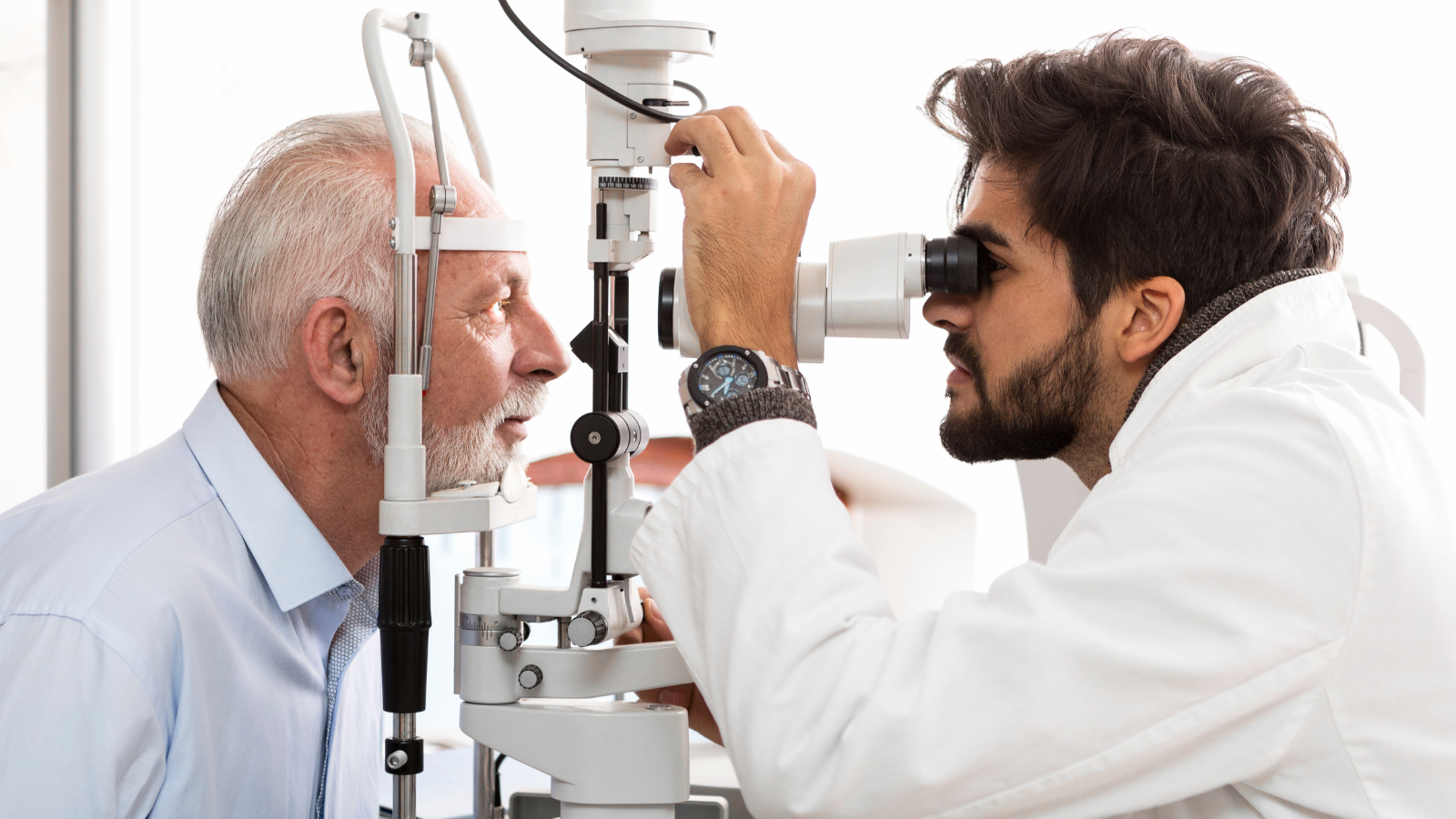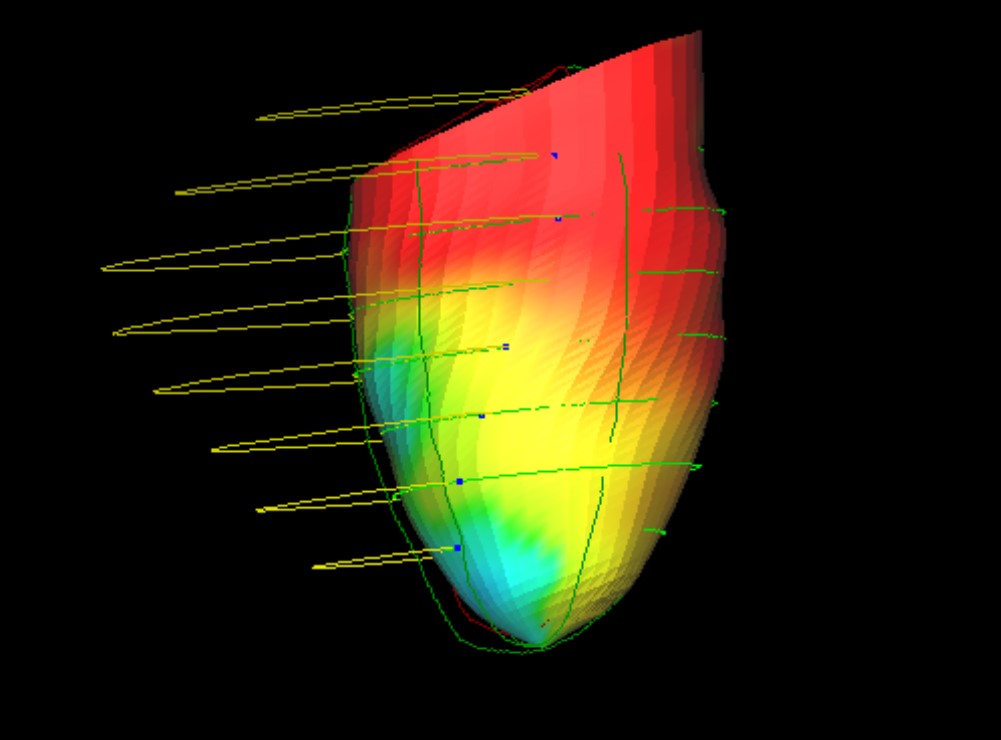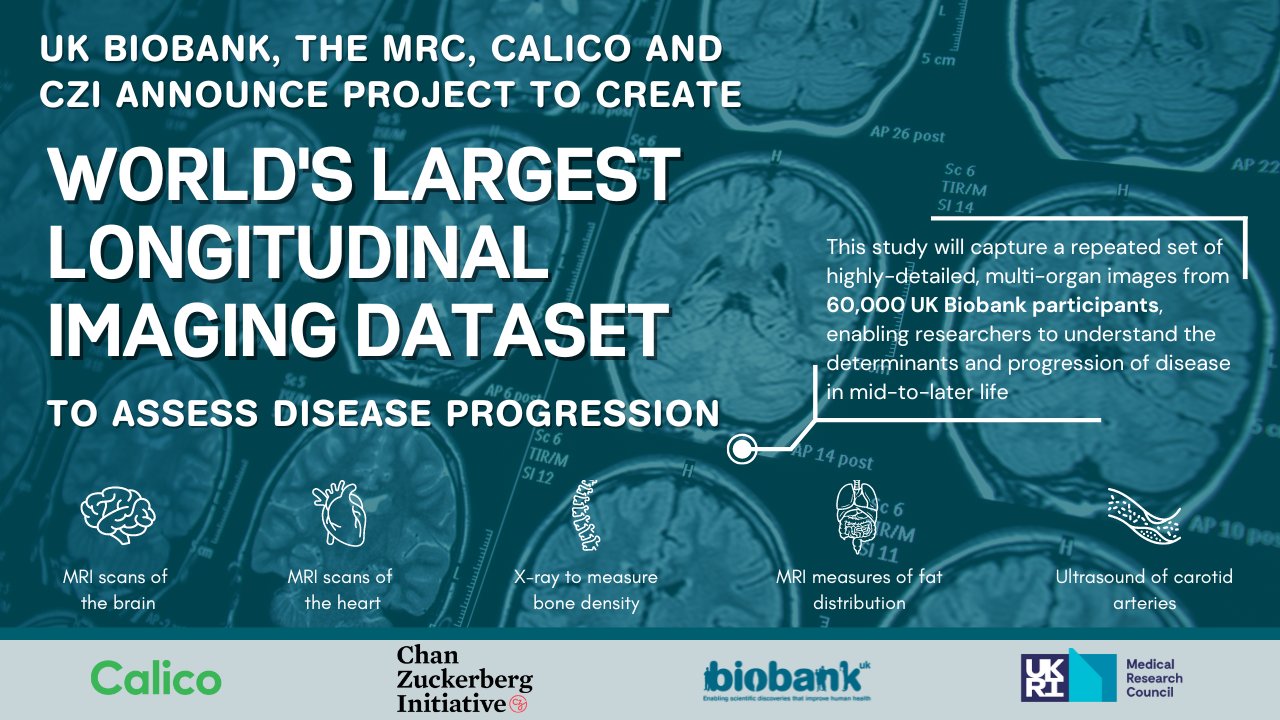Repeat imaging visit
We are inviting 60,000 UK Biobank participants back to attend a repeat imaging assessment
The £30M project will capture a repeated set of highly-detailed, multi-organ images from 60,000 UK Biobank participants, allowing researchers to assess changes in physiology over time. This effort will enable a better understanding of the trajectory of major chronic diseases of mid-to-later life and enable researchers to explore the mechanisms through which diseases occur in individuals.
The project has been funded by the Medical Research Council (MRC); Calico Life Sciences, a biotechnology organization founded by Alphabet and Arthur D. Levinson; and the Chan Zuckerberg Initiative (CZI), a philanthropy founded by Priscilla Chan and Mark Zuckerberg.
UK Biobank participants that have completed their first imaging visit will be invited to attend a repeat set of scans two or more years after their initial visit.
What to expect at your repeat imaging visit
The UK Biobank repeat imaging study is the only one of its kind in the world. The baseline imaging assessment you attended previously was already the most ambitious imaging project globally with the aim to scan the brain, heart, bones and abdomen of up to 100,000 UK Biobank participants. By capturing a range of images of the human body at more than one time point, you can help to enable scientific advances in the diagnosis and prevention of diseases like dementia, heart disease and cancer.
The imaging assessment lasts around 4-5 hours and involves taking imaging scans of your internal organs and the collection of more information about your health and lifestyle, along with a small donation of blood.
We take very seriously the health and safety of our participants and staff alike, and put in place strict measures to ensure that our imaging centres are safe. We routinely review our operational practices to reduce the risks to safety and to prevent the transmission of infections.
We are inviting all UK Biobank participants by email (where we have an email address) and by post. If you would like to attend a repeat imaging assessment centre, please phone our Participant Resource Centre on 0800 0 276 276, who will ask you a few questions to ensure it’s completely safe for you to undertake the scans (e.g., you will not be able to take part if you have any metal or electrical implant [such as a pacemaker] in your body).
We are aiming to invite up to 6,000 participants to a repeat visit, regardless of whether you are in good health or have ongoing health problems. If you have a disability or require help reading questions during the visit, you can still take part, even if you cannot undergo some of the physical measurements - your contribution is still of enormous value to the study.
A unique picture of health
The assessment lasts around 4-5 hours and involves imaging the heart, brain, abdomen and bones plus the collection of more information about your health and lifestyle, eye measures, and a donation of blood.
- MRI assessment of heart chamber diameter, the volume of blood flow, and how the heart changes as it pumps blood around the body, thickness of the heart wall and the size, shape and stiffness of the thoracic aorta, the vessel that delivers blood from the heart
- MRI measures of brain structure and function, volumes of grey matter and the mapping of major brain connections
- Dual-energy X-ray absorptiometry measures of bone density, osteoarthritic change at spine, hip and knee, fractures in the spine, and fat distribution throughout the body
- MRI measures of abdominal fat volume including in the liver and pancreas
- Ultrasound assessment of two major arteries, the carotid arteries, that run either side of the neck to the brain

Additional repeat imaging assessments of the eye
At your repeat imaging visit you will also undergo autorefraction and OCT measures of the eye. These measurements are similar to those undertaken at an opticians visit and take place in a darkened room with devices that take detailed pictures of the eye.
These measures will enable researchers to investigate conditions that affect both the eye and vision and also how measurements of the eye can predict other major diseases such as Alzheimer's and heart disease.

How to book your visit
Please let us know if you would like to take part by phoning us free of charge on: 0800 0 276 276 (Monday to Friday 9am to 5pm)
During this call, you will be able to ask us any questions that you might have. We will also ask you some questions about your medical history to check your suitability for the scans.
If you are eligible to take part, we will arrange an appointment for you. Appointments are generally available from 8am to 2:45pm, Monday to Sunday, and last for four to five hours.
We will send you a letter confirming your appointment and giving directions to the assessment centre. If you have provided us with an email address and mobile phone number, we will also send you an email or text reminder a couple of days before your visit.
Travel expenses
Your repeat imaging assessment will take place at the centre which you attended for your baseline imaging assessment, to make sure that your repeat set of images are directly comparable to your baseline images.
We appreciate that some participants live a considerable distance away. You can claim the cost of travel to the assessment centre by public or private transport, using the claim form that we will provide you with.
Where are the imaging centres?
We have imaging centres in Newcastle upon Tyne, Stockport, Reading and Bristol. For some participants this means you will have to travel further than when you attended your original assessment. We are sorry about this (you can claim expenses). Because of the huge cost in building an imaging centre, we have based them at the centre of the largest number of UK Biobank participants in a given area.
How will the images be used?
The multi-organ scans will be analysed alongside the vast data already collected from UK Biobank participants. They can also be compared against the scans from your baseline visit. This extra layer of data, for all health scientists to access, will give new perspectives on the best way to prevent and treat multi-faceted conditions like arthritis, coronary heart disease, Alzheimer’s disease and osteoporosis.
The imaging project has already sparked new ways in which to analyse and interpret scans. Such a vast amount of data needs innovative techniques for analysis. Heart scan measurements are usually manually taken, but with over 9,000 images of the heart taken per participant, researchers have had to develop new computer based techniques, with potential benefits for research as well as for the investigation of patients in the future.

Will you tell me if you spot something wrong with my health?
The scans we do are not intended to diagnose disease. They are not designed to find any particular abnormalities and will not be routinely analysed by doctors or other specialists.
The technicians (radiographers) who do the scans will be looking at the images to make sure of their quality, rather than looking for evidence of any health problems.
Heart Monitor: can you help doctors prevent stroke and dementia?
If you are aged 65 and over you may be asked if you would be prepared to help us learn more about common heart rhythm disturbances, such as atrial fibrillation (AFib). Professor Barbara Casadei from Oxford University, who leads the heart monitoring study, explains why this is so important.
Last updated

